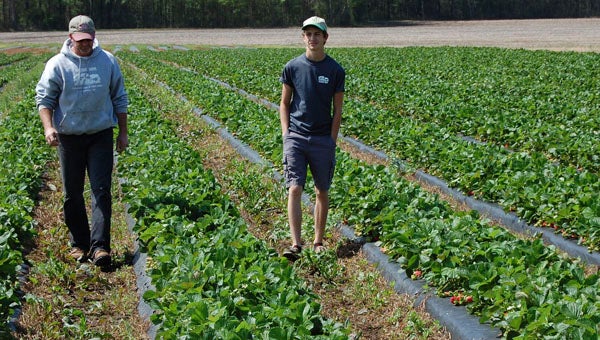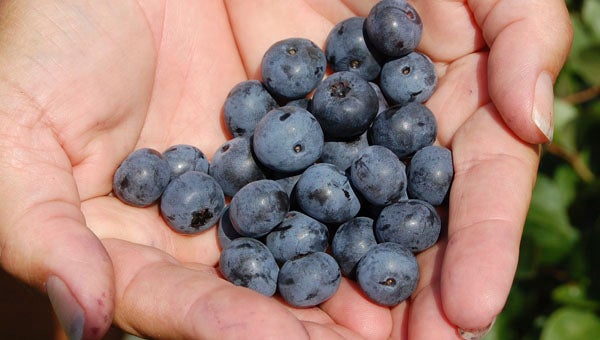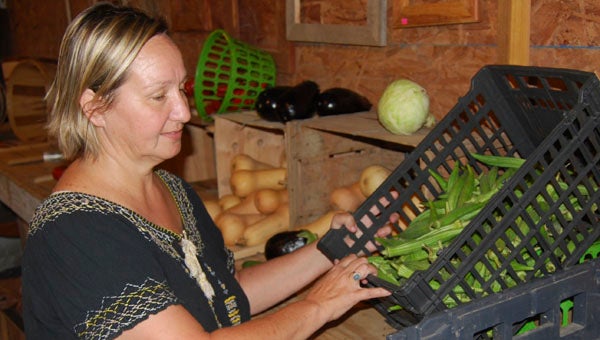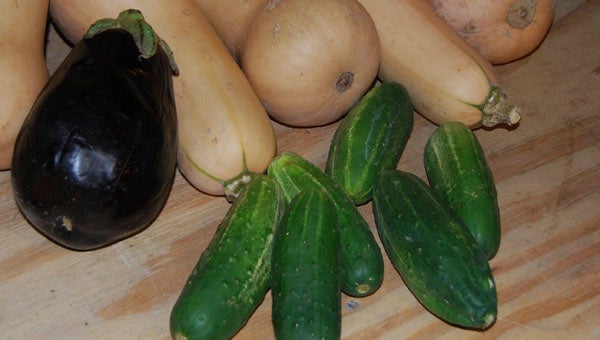From local farms to your dining room table: Goodness grows in Beaufort County
Published 4:52 pm Saturday, October 11, 2014

KEVIN SCOTT CULTER | DAILY NEWS
FARMING HERITAGE: Shawn Harding (left) and his son Jonah Harding inspect a strawberry field last spring.
CHOCOWINITY — Shawn Harding settles back in a chair in his office at Southside Farms, ready to take a break after spending the day planting collards.
He’s tired, a bit dirty and sweaty, but none of that dims his enthusiasm for his chosen profession.
Harding farms land in Chocowinity that has been in his family for generations. But where tobacco once flourished, Harding and his crew now grow fresh vegetables and berries. Southside Farms is a major player in a movement that promotes shopping locally, supporting area farmers while enjoying the best produce nature has to offer.
“We have steadily progressed in the last 15 years to try to grow everything ourselves,” Harding said. “This past spring we didn’t sell anything we didn’t grown here. That’s my goal.”
Harding referenced a sign hanging in Southside Farms’ retail market. It reads “If you see it, we grew it.”
“It’s challenging to grow everything ourselves, very challenging,” Harding admitted. “People want to know where their food is grown, and the relationship to our customers is what I’m trying to build. That’s important to me. People always ask where things come from.”

KEVIN SCOTT CUTLER | DAILY NEWS
BERRY GOOD: Blueberries grown in Beaufort County soil and harvested each summer are among the local farm to table offerings.
Harding said he does break his own “rule” occasionally, but only in order to offer his customers variety. Sweet potatoes are one crop Southside doesn’t grow, but since the vegetable is in demand, Harding makes sure he has a good supply on hand.
“I get them from friends in Nash and Wilson counties, so I can still vouch for the freshness and flavor,” Harding said. “That is one exception I have made to my rule this year, but it does allow me to bring in several varieties.”
Crops grown right there in the Chocowinity soil include strawberries, blueberries, blackberries, cucumbers, squash, sweet corn, string beans, collards, kale, turnips, mustard greens, cabbage … the list goes on. Southside even grows an abundant crop of greenhouse tomatoes, a favorite of local consumers.
“We’re committed to trying to grow everything people want,” Harding said.
Quality control is important to the folks at Southside Farms. For example, when a customer drives up and requests collards or cabbage, someone from the farm walks out into the field to harvest the produce on request. Items don’t sit around in bins and boxes for days at a time.
“With most of our produce, we try to pick in the morning what we’ll sell that day,” Harding noted. “You can’t get any fresher.”
Benjamin Davis, owner of Leggett Farms west of Washington, is exploring a niche market that focuses on that most Southern of vegetables. Collards are a staple of Thanksgiving and Christmas feasts, but they’re equally sought after for most any meal.

KEVIN SCOTT CUTLER | DAILY NEWS
FRESH TO YOU: Jane Boahn inspects local produce available at her market, Raised in a Barn Farm.
And Davis grows his collards with a bit of a twist; they’re all organic.
“I’d venture that we’re one of the few farms in eastern North Carolina that grows organic yellow cabbage collards,” Davis said. “We usually plant our collards in early to mid-September so they will be ready for harvest in late October. And starting next year, we’ll have them year round.”
Leggett Farms is a U.S. Department of Agriculture-certified farm, which means Davis follows rigid guidelines when growing and harvesting his organic crops, which also include kale and mustard greens.
“We’re growing some great tasting collards, but without the chemicals,” he pointed out. “There are lots of pesticides out there that are just plain bad for you.”
Davis said his farm once produced a wider variety of vegetables, but he has decided to simplify the operation..
“Instead of trying to grow everything, we’re going to focus on what we’re good at,” he said. “I’m growing a product that is a premium product.”
Leggett Farms will sell its harvest through its retail market, and Davis said he is exploring options for online ordering as well. He expects his collards, especially, will be in great demand.
“I think the trend across the country is going from farm to table, or from organic farm to table,” he said. “Do you really trust big business to tell you what’s good for you?”
Shopping locally and buying produce that is grown in the area is a good way to help farmers and maintain a healthful diet, according to Davis.
“We’re in a farming town here,” he said. “What a great way to support local farmers, and the best thing is you know where and how your food is grown.”
Like Southside Farms, Leggett Farms is a family tradition. Davis is the grandson of Josephus and Mabry Leggett, who once owned the farm he now oversees.

KEVIN SCOTT CUTLER | DAILY NEWS
HOMEGROWN: Locally grown squash, eggplant and cucumbers make an attractive vegetable still life.
Briley’s Produce is a familiar name to local residents, who have frequented the Pactolus farm market for years. The family-owned enterprise expanded with three additional markets in Greenville, and this year Briley’s opened a Beaufort County location just east of Washington, according to employee Job Tugwell.
Tugwell was manning the Washington market on a recent Saturday morning, and he was eager to talk about the farm, where he has worked for three years. He mainly harvests the produce, he said, but a couple days each week he is pressed into service at the produce market.
“We have squash, cucumbers, zucchini, peanuts, tomatoes, sweet potatoes, green peppers, watermelon, okra,” he said. “Most of what we sell here is produced locally, but we do get our peaches from Walstonburg.”
Customers like knowing that the foods are harvested locally, Tugwell said.
“They always seem to ask that question,” he said. “I think they like finding out it is local stuff. It helps the local economy … farmers put a lot of time and effort into it.”
Tugwell added that while Briley’s is proud of its fresh produce, the farm is also well known locally for its fall Pumpkin Patch, which allows area residents to venture out into the fields and choose their own pumpkins. That’s also a project popular during the fall season at Southside Farms.
Events that bring together the community are important to the folks at Raised in a Barn Farm in Chocowinity, which hosted Christmas and Easter events during its first year of operation. The farm is the perfect setting for birthday parties and other family events, too.
They plan to continue those traditions as well as maintaining its reputation of offering fresh produce, according to owner Jane Boahn.
“We grow some things ourselves here on the farm, but we sell even more of the things grown by neighbors,” Boahn said. “We have families that provide us with okra, butter beans, collards, field peas, green beans … anything seasonal that we don’t already have.”
Raised in a Barn Farm’s market is stocked with varieties of produce, but customers also partake of the cakes, pies, breads, jellies and jams, all freshly prepared in the farm’s kitchen.
“We don’t even buy our pie crusts, we make them from scratch,” Boahn said. “And we have a lady who comes in and makes fresh whole wheat, garlic and spinach pastas in our state-certified kitchen.”
Community Supported Agriculture baskets are a favorite among Raised in a Barn Farm’s customers. The farm has launched its fall program, which provides consumers with weekly baskets of food items through mid-December.
The baskets are a cornucopia of fresh produce, which varies upon availability. But staples include collards, cabbage, beans, potatoes, winter squash, peanuts, pecans and even goat cheese. And tucked in among the produce is usually a small pie or jar of jelly, Boahn said.
Boahn has a network of home gardeners who are willing to stock the farm’s retail market and make a little extra money on the side.
“If you have a garden growing in your backyard, or fig trees in your yard, we’ll sell it,” she said. “We’re trying to gather local produce … we’re trying to help the neighbors sell their stuff. If I can get it from friends and neighbors, that’s where I’ll get it.”





